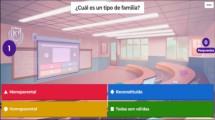Abstract
The arrival of online programs in education is pushing educators to promote new ways of teaching to engage students. Nonetheless, most higher education teachers are not trained in the practices of e-learning. In this paper, our purpose is to study whether the use of gamification better promotes learning in online courses. Over 6,000 participants enrolled in the MOOC “Conventional and green energy sources” as a part of the activities of the “Binational Laboratory on Smart Sustainable Energy Management and Technology Education” project. About 1,000 eventually completed it. Main results indicate that for all participants’ profiles (i.e., gender, age, and educational level) the completion of a gamification challenge favored higher final test scores on the contents of the course. This lead us to think that gamification improves students’ performance in online teaching. However, there are technical limitations associated to the courses platforms that need to be solved for teachers to be able to implement non-traditional learning approaches.
Access this chapter
Tax calculation will be finalised at checkout
Purchases are for personal use only
Similar content being viewed by others
References
Rohatgi, A., Scherer, R., Hatlevik, O.: The role of ICT self-efficacy for students’ ICT use and their achievement in a computer and information literacy test. Comput. Educ. 102, 103–116 (2016)
Sánchez, A.B., Mena, J., He, G., Pinto, J.: Teacher development and ICT: the effectiveness of a training program for in-service school teachers. Procedia Soc. Behav. Sci. 92, 529–534 (2013)
Kergel, D., Heidkamp, B.: The digital turn in higher education towards a remix culture and collaborative authorship. In: The Digital Turn in Higher Education, pp. 15–22. Springer Fachmedien Wiesbaden, Wiesbaden (2018). http://doi.org/10.1007/978-3-658-19925-8_2
Cutri, R.M., Whiting, E.F.: Opening spaces for teacher educator knowledge in a faculty development program on blended learning course development. Stud. Teach. Educ. 14(2), 125–140 (2018)
Ramírez-Montoya, M.-S., Mena, J., Rodríguez-Arroyo, J.A.: In-service teachers’ self-perceptions of digital competence and OER use as determined by a xMOOC training course. Comput. Hum. Behav. 77, 356–364 (2017). https://doi.org/10.1016/J.CHB.2017.09.010
Oswal, S.: MMOC in the global context. In: Monske, E., Blair, K. (eds.) Handbook of Research on Writing and Composing in the Age of MOOCs, pp. 39–55. IGI Global, Hershey (2017)
Bartolomé, A.R., Steffens, K.: Are MOOCs promising learning environments? Comunicar 44, 91–99 (2015). https://doi.org/10.3916/C44-2015-10
Xing, W., Chen, X., Stein, J., Marcinkowski, M.: Temporal predication of dropouts in MOOCs: reaching the low hanging fruit through stacking generalization. Comput. Hum. Behav. 58, 119–129 (2016). https://doi.org/10.1016/j.chb.2015.12.007
Werbach, K., Hunter, D.: The Gamification Toolkit. Wharton Digital Press, Philadelphia (2015)
Lee, J., Hammer, J.: Gamification in education: what, how, why bother. Acad. Exch. Q. 15(2), 146 (2011)
Rincón-Flores, E., Ramírez-Montoya, M.S., Mena, J.J.: Challenge-based gamification as a teaching’ open educational innovation strategy in the energy sustainability area. In: Proceedings of the Fourth International Conference on Technological Ecosystems for Enhancing Multiculturality, TEEM 2016, Salamanca, Spain (2016a). http://hdl.handle.net/11285/620886
Hew, K.F.: Promoting engagement in online courses: what strategies can we learn from three highly rated MOOCS. Br. J. Edu. Technol. 47(2), 320–341 (2016). https://doi.org/10.1111/bjet.12235
Kahan, T., Tal, S., Nachmias, R.: Types of participant’s behaviors in a massive open online course. In: EDEN 2015 Annual Conference Book of Abstracts -Expanding Learning Scenarios, vol. 18, pp. 52–53, June 2015. https://doi.org/10.19173/irrodl.v18i6.3087
Kerlinger, F., Lee, H.: Investigación del Comportamiento. Métodos de investigación en Ciencias Sociales. Cuarta edición. MacGraw-Hill, México (2002)
Ramírez-Montoya, M.S., García, C., González, S., Aldape, P., Farías, S.: Estadísticas de Impartición de MOOC’s en abril 2017 (Presentación del Proyecto 266632 Laboratorio Binacional para la Gestión Inteligente de la Sustentabilidad Energética y Formación Tecnológica). Tecnológico de Monterrey, Monterrey, México. Documento inédito. Disponible en (2017). http://hdl.handle.net/11285/622441
Armstrong, L.: 2013- The year of ups and downs for the MOOCs. Changing Higher Education (2014). http://goo.gl/SqwGWn
Liyanagunawardena, T., Williams, S., Adams, A.: The impact and reach of MOOCs: a developing countries’ Perspective. eLearning Papers 1(33), 1–8 (2013). http://elearningeuropa.info/sites/default/files/asset/In-depth_33_1.pdf
Lenhart, A., Kahne, J., Middaugh, E., Rankin Macgill, A., Evans, C., Vitak, J.: Teens, Video Games, and Civics: Teens’ gaming experiences are diverse and include significant social interaction and civic engagement. Pew Internet & American Life Project, pp. 1–64 (2008). http://doi.org/10.1016/j.chembiol.2006.01.005
Author information
Authors and Affiliations
Corresponding author
Editor information
Editors and Affiliations
Rights and permissions
Copyright information
© 2019 Springer Nature Switzerland AG
About this paper
Cite this paper
Mena, J., Rincón Flores, E.G., Ramírez-Velarde, R., Ramírez-Montoya, M.S. (2019). The Use of Gamification as a Teaching Methodology in a MOOC About the Strategic Energy Reform in México. In: Di Mascio, T., et al. Methodologies and Intelligent Systems for Technology Enhanced Learning, 8th International Conference. MIS4TEL 2018. Advances in Intelligent Systems and Computing, vol 804. Springer, Cham. https://doi.org/10.1007/978-3-319-98872-6_4
Download citation
DOI: https://doi.org/10.1007/978-3-319-98872-6_4
Published:
Publisher Name: Springer, Cham
Print ISBN: 978-3-319-98871-9
Online ISBN: 978-3-319-98872-6
eBook Packages: Intelligent Technologies and RoboticsIntelligent Technologies and Robotics (R0)




